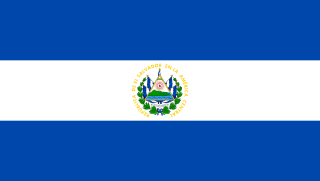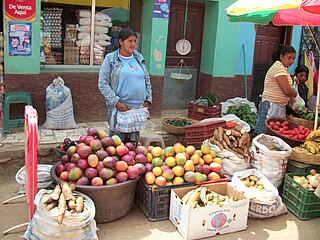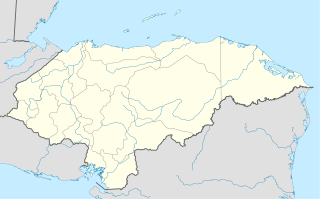See also
| This disambiguation page lists articles associated with the title Lenca. If an internal link led you here, you may wish to change the link to point directly to the intended article. |
Lenca may refer to:
| This disambiguation page lists articles associated with the title Lenca. If an internal link led you here, you may wish to change the link to point directly to the intended article. |

El Salvador, officially the Republic of El Salvador, is the smallest and the most densely populated country in Central America. It is bordered on the northeast by Honduras, on the northwest by Guatemala, and on the south by the Pacific Ocean. El Salvador's capital and largest city is San Salvador. As of 2018, the country had a population of approximately 6.42 million, mostly consisting of European and Native American descent.

This article is about the ethnic groups and population of Honduras.

Central America is dominated by the popular Latin music, or Black Caribbean trends, including salsa, cumbia, mariachi, reggae, calypso and nueva canción. The countries of Central America have produced their own distinct forms of these genres such as Panamanian salsa, among others. One of the well-known forms of Central American music is punta, a style innovated by the syncretic Garifunas who live across the region, in Honduras, Nicaragua, Guatemala and Belize. The marimba, a type of xylophone, is perhaps the most important folk instrument of Central America, and it is widespread throughout the region.

The culture of El Salvador is a Central American culture nation influenced by the clash of ancient Mesoamerica and medieval Iberian Peninsula. Salvadoran culture is influenced by Native American culture as well as Latin American culture. Mestizo culture and the Catholic Church dominates the country. Although the Romance language, Castilian Spanish, is the official and dominant language spoken in El Salvador, Salvadoran Spanish which is part of Central American Spanish has influences of Native American languages of El Salvador such as Lencan languages, Cacaopera language, Mayan languages and Pipil language, which are still spoken in some regions of El Salvador.

The Lenca are a Mesoamerican indigenous people of southwestern Honduras and eastern El Salvador in Central America. They once spoke the Lenca language, which is now nearly extinct. In Honduras, the Lenca are the largest indigenous group, with an estimated population of 100,000. El Salvador's Lenca population is estimated at about 37,000.

La Esperanza is the capital city and a municipality of the same name of the department of Intibucá, Honduras. La Esperanza is famous for having the coolest climate in Honduras. It is considered the heart of the Ruta Lenca, a region of Lenca ethnic influence that spans Honduras from Santa Rosa de Copan to Choluteca. Sites on the Lenca Trail have been designated by the government and United Nations development in order to encourage more cultural tourism, and help create new markets for the traditional crafts, such as pottery, practiced by the Lenca, in order to preserve their culture.

Marcala is a municipality in the Honduran department of La Paz. The region is known for its coffee production, boasting the first "protected origin denomination" for coffee. Marcala has been designated as a center of Lenca Trail, a government and United Nations sponsored development effort to encourage tourism to Lenca communities. It offers visitors perspective on the culture of indigenous people and provides new markets for their traditional crafts.

Intipucá is a small municipality in the southwestern La Unión department of El Salvador.

Lempira was a war chieftain of the Lencas of western Honduras in Central America during the 1530s, when he led resistance to Francisco de Montejo's attempts to conquer and incorporate the region into the province of Honduras. Mentioned as Lempira in documents written during the Spanish conquest, he is regarded by the people as a warrior hero.
Lencan is a small family of nearly extinct indigenous Mesoamerican languages.
Toquegua may be the name of a group of people, and a language, spoken along the Atlantic coast of Guatemala and Honduras from the area around the mouth of the Golfo Dulce to the Ulua river in Honduras. It is also an elite indigenous family surname in colonial Honduras, and a place name in the Motagua river valley in 1536. Feldman (1975), largely based on unpublished notes of Nicholas Helmuth conserved in the American Philosophical Society, concludes that Toquegua is a Chʼol Mayan-related language. Sheptak (2007) contests that identification and concludes the people referred to as the Toquegua were multi-lingual, speaking Yucatec, Chʼol, Nahuatl, and Lenca.

Salvadorans, also known as Salvadorians, are people who identify with El Salvador in Central America. Salvadorans are mainly Mestizos who make up the bulk of the population in El Salvador. Most Salvadorans live in El Salvador, although there is also a significant Salvadoran diaspora, particularly in the United States, with smaller communities in other countries around the world.
Cephalotes lenca is a species of arboreal ant of the genus Cephalotes, characterized by an odd shaped head and the ability to "parachute" by steering their fall if they drop off of the tree they're on. Giving their name also as gliding ants. The species is native of Nicaragua and Honduras. Their larger and flatter legs, a trait common with other members of the genus Cephalotes, gives them their gliding abilities.
Rugby union in Honduras is a minor, but growing sport.
The Council of Popular and Indigenous Organizations of Honduras is a Honduran organization founded in 1993, which is dedicated to the defense of the environment in Intibucá and the defense of the indigenous Lenca people. COPINH is known for its mobilizing capacity. Anthropologist Mark Anderson describes it as "a pivotal force within the ethnic movement" in Honduras. It advocates for indigenous rights, participates in conflicts over resources, and opposes neoliberal economic policies, which it describes as "the pillage and re-colonization of our country." It has organized protests against water privatization, hydroelectric dams, and United States foreign policy.

The Gualcarque River is a river in Intibucá, western Honduras. It is sacred to the indigenous Lenca, who depend on the river for their subsistence. It is the site of the proposed Agua Zarca hydroelectric dam, a joint Honduran-Chinese project.

Ballet Folklórico de Honduras Oro Lenca is a Honduran folkloric ballet troupe in La Esperanza. It was founded in 2008 and presents dances and costumes that reflect the traditional culture of Honduras. This dance troupe hosts an annual folk dance festival, El Grande de Grandes, and represents Honduran culture internationally. It also mentors nascent dance groups in villages, towns, and cities of Honduras. In November 2015, the National Congress of Honduras designated Ballet Folklórico Oro Lenca Patrimonio Cultural de la Nación, and subsequently designated Ambassadors of Art and Culture by executive decree.
There are a number of languages spoken in Honduras though the official language is Spanish.

Intibucá is a municipality and city in the department of Intibucá, Honduras. The urban area of Intibucá is an important transit and commercial site in the South-West region of Honduras. Located 1,850 meters above sea level, Intibucá has a cool and often foggy climate, hence the nickname "La ciudad del manto blanco". Potato production, celebrated by the annual Festival de la Papa, is the principle basis of the economy for the municipality.
MILPAH is an indigenous rights group, based in the La Paz region of Honduras.